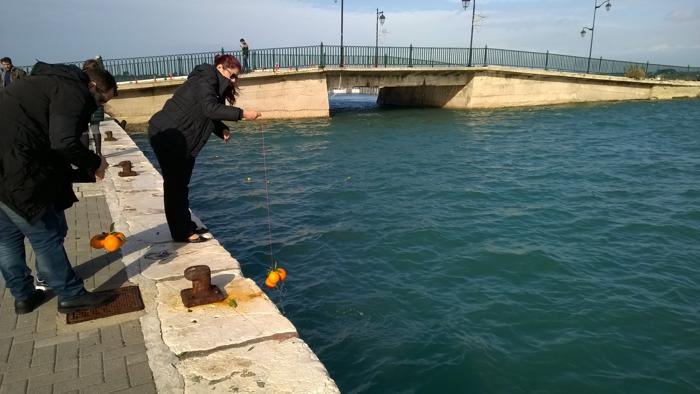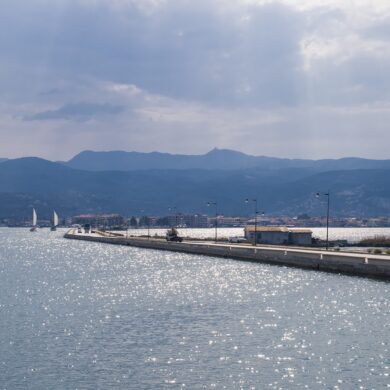Epiphany was the most brilliant, the most out-going day of the Twelve Days of Christmas – maybe of the whole winter – in Lefkada town. In the early morning any church-goers went to church to fetch holy water to bring home, to sprinkle all the rooms with a twig of myrtle for good luck. Afterwards everyone went down to the seashore for the blessing of the waters.
Priests, the bishop, the choir, the metal disks on staffs depicting six-winged (hexapteryga) seraphs and, of course, the band of the Philharmonic. Everyone, and especially the children, carried oranges tied with string by their stalks. Meanwhile the fishing boats, the trawlers and rowing boats were crowded with people, among them young men ready to dive in to catch the cross.
The chanting would begin and the bishop threw the cross into the sea: “In the river Jordan, Lord, you are baptized…” Immediately, young men dived in and swam to the spot to catch the cross, which was considered a blessing and a privilege. At that moment the band began playing, the boats celebrating the moment with their hooters, and all those who carried oranges hurried to plunge them into the sea to be blessed. The blessing of the waters was a joyful official hullabaloo, festive and a universal manifestation of joy. The oranges were then taken home, transporting the blessing of the sacred waters. One was placed by the icons until the next year and the rest was eaten by the family.
Our parents told us that in the old days whoever caught the cross put it on a tray and went round all the houses reverentially, to be given money.
Rolls for humans and animals
“Kouloura, Photokoulouro. Is the name of a bread roll, not circular like a koulouri. It is a pan-baked loaf with a crust of sesame and a cross made of dough on top.
Voidopsomo. This loaf is made of the same dough, again baked in a pan, for the yoke oxen. The oxen, with the plough and the farmer holding it are shaped with dough on the top.
Arnokouloura. The same bread, in a pan, made for the sheep and goats of the family’s flock. A ewe is shaped on top with dough, with the lambs.
My father would not sit down to his meal if he hadn’t first been to the stable to give each animal a morsel of their own bread. We ate the rest. It was ordinary bread.”
Told by Vassilo Sklirou from Vassiliki
Marriage (of fire)
Other than its universally known meaning, the word is used metaphorically in many instances of daily life. For example: “I took a kilo of goat’s meat and married it to a quantity of pork and made a lovely soup.”
“I married a pear tree with an apple tree” meaning the pear was grafted with a node of apple.
In customs: “We marry the fire” means we put a variety of logs of our choice on the fire, according to the custom. This is done on Christmas or New Year’s eves in the evening, in a formal and celebratory ritual. A pile is made in the fireplace of diverse woods of trees, plants and bushes such as olive, fig, arbutus, lentisk and more; it is then sprinkled with wine, oil and vinegar and set alight, making the sign of the cross, everyone wishing ‘happy returns of the day’.
Pantazis Kontomihis,
Λεξικο του Λευκαδιτικου Γλωσσικου Ιδιωματος
(Dictionary of the Lefkadian Vernacular),
Gregoris Ed., Athens 2005
The marriage of fire
“On the eve of Epiphany, before breaking the Cross bread, we piled all sorts of woods together to burn, olive, arbutus, holm oak, almond tree, all sorts… That was the marriage of the fire. We all sat around and enjoyed the warmth and the flames.”
Women from Tsoukalades, Dragano and other




